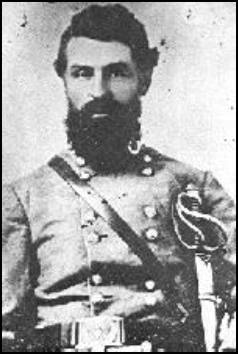View our Civil War Sequicentennial site
Confederate Gen. Sterling Alexander Martin Wood, commonly known as S.A.M. Wood, resigned from the Confederate Army in October 1863. The resignation came shortly after the South's greatest victory in the West, the battle of Chickamauga, in which Wood had been an active participant.
So why did he resign?
Was it because he was incompetent, or because he was once accused of cowardice? Or for reasons we will never truly know?
Before the Civil War, Wood had been a lawyer, a state legislator and a journalist in Alabama. He entered the Confederate Army in 1861 and rose to the rank of brigadier general within a year.
He was initially stationed in Pensacola, Fla., under the command of Gen. Braxton Bragg. Unlike most other officers, he liked Bragg. The two men formed a warm relationship.
Bragg brought his Pensacola troops with him to the battle of Shiloh, Tenn. They were considered among the best troops at the battle.
Some of the S.A.M. Wood enigma started at Shiloh. During the attack of the first day, the general's horse was wounded. As he was thrown, his foot caught in the stirrup, and he was dragged across battle lines through Union tents. He suffered a concussion, was taken to the field infirmary, and remained there for about three hours. Gen. Thomas Hindman, who outranked Wood, barged into the infirmary and ordered Wood to report to his brigade. Hindman implied that Wood was malingering.
Wood already disliked Hindman. He saw Hindman with his perfumed hair as a pompous dandy and self-important braggart. The Shiloh encounter deepened Wood's animosity.
Overall, Wood and his brigade performed well at Shiloh. From there they went to fight in the battle of Perryville, Ky.
At Perryville, Wood and his brigade also did well; however Wood's reputation would again be tarnished.
During the battle, a shell burst wounded Wood. As at Shiloh, he was thrown from his horse. His injury took him out of the battle. When his second in command, Col. Mark Lowery, also was wounded, several in the brigade developed the mistaken impression of fighting the remainder of the Perryville battle without a commanding officer.
This, of course, was not true, but a Knoxville newspaper reported a damning account: Wood was hiding out during the battle of Perryville. All of the officers in Wood's brigade quickly denounced the newspaper account and stated that Wood had performed valiantly. Sadly, as with a lot of slander, some of the mud stuck.
At Chickamauga, Wood's brigade was part of Gen. Patrick Cleburne's division. Some historians have been critical of Wood on two points. First, on Sept. 19 during Cleburne's night attack, Wood's brigade fell behind. Second, on Sept. 20, Wood's brigade moved too far south and became entangled with Gen. A.P. Stewart's division.
In fairness to Wood, one has to consider the circumstances of both. On Sept. 19, Wood's brigade was the only one advancing through an open field exposed to Union fire. The two other Confederate brigades were moving faster through trees. On Sept. 20, divisions and brigades shifted about in the chaotic Chickamauga battle. This shifting and the associated entangling of various units occurred frequently during the Civil War with both Union and Confederate units.
In his after-action report Cleburne did not criticize or praise Wood. Some historians contend that S.A.M. Wood resigned because his feelings were hurt. This seems unlikely because his brother, Maj. Henry Clay Wood, continued to serve in his brother's former brigade in Cleburne's division.
To answer why Wood resigned, one needs to look elsewhere. First, Wood was concerned about events with his family in Tuscaloosa, Ala. Second, he had suffered with chronic diarrhea for almost his entire service. In fact, in October 1861 he considered dropping out unless he saw improvement by Christmas.
A final reason might be Wood's failure to be promoted. After the Kentucky campaign, Cleburne had been promoted over Wood, even though Wood had seniority. Then at McLemore's Cove, Bragg ordered Hindman, a new addition to Bragg's command, to initiate the attack. Wood, Bragg's senior brigade commander, felt the job should have been his.
Wood had already lost respect for Bragg but to be bypassed by Hindman, a man Wood despised, may have been the final straw.
Dr. R. Smith Murray is a retired urologist. Chris Young is a National Park Ranger and historian. For more, contact LaVonne Jolley at 886-2090 or visit www.chattahistoricalassoc.org.

